- Home
- Laura Marie Altom
Marrying the Marshal
Marrying the Marshal Read online
The United States Marshals Service
Formed in 1789 by President George Washington, the United States Marshals Service is the oldest federal law enforcement agency—and in my mind, one of the most mysterious. They used to carry out death sentences, catch counterfeiters—even take the national census. According to their Web site, “At virtually every significant point over the years where Constitutional principles or the force of law have been challenged, the marshals were there—and they prevailed.” Now the agency primarily focuses on fugitive investigation, prisoner/alien transportation, prisoner management, court security and witness security.
No big mystery there, you say? When I started this series, I didn’t think so, either. Intending to nail the details, I marched down to my local marshals’ office for an afternoon that will stay with me forever.
After learning the agency’s history and being briefed on day-to-day operations, I was taken on a tour. I saw an impressive courtroom and a prisoner holding cell—not a good place to be! Then we went to the garage to see vehicles and bulletproof vests and guns! Sure, I’m an author, but I’m primarily a mom and wife. I bake cookies and find hubby’s always-lost belt. Remind my daughter’s cheerleading squad which bow to wear. Nothing made the U.S. Marshals Service spring to life for me more than seeing those weapons—and I’m talking serious weapons! And then I glanced at my tour guide and realized that this guy wasn’t fictional, but used those guns, put his very life on the line protecting me and my family and the rest of this city, county and state. I had chills.
Things really got interesting when I started digging for information on the Witness Security Program. Deputy Marshal Rick ever so politely sidestepped my every question. I found out nothing! Not where the base of operations is located, not which marshals are assigned to the program, where/who those marshals report to on a daily basis, what size crews are used, how their shifts are rotated—nothing! After a while it got to be a game. One it was obvious I’d lose!
Honestly, all this mystery probably makes for better fiction. I don’t want to know what really happens. It’s probably not half as romantic as the images of these great protectors I’ve conjured in my mind. Oh, and another bonus to my tour—Deputy Marshal Rick was Harlequin American Romance-hero hot!
Laura Altom
Dear Reader,
I grew up reading Harlequin romances, and after the birth of my twins, I decided to try writing them. So far—knock on wood—that seems to be working out. But even after immersing myself in all of those happy endings, only now have I truly understood the healing power of these constantly underrated books.
At the time of wrapping up this story, my husband and I have weathered what has been one of our toughest storms in over seventeen years of marriage. Coping with my husband’s grandmother’s advancing dementia, we’ve made the decision to welcome her into our home—only, our current home isn’t big enough, so we’re in the process of moving. With two preteens, our finances have always been tight, but now especially so. I’ve taken on a second job to help make ends meet.
Times have been tough. I used to be fortunate enough to spend my days leisurely writing. I now, like so many of you, hustle off to work. I squeeze in writing between cooking and laundry and chauffeuring kids to their many activities. At first I wasn’t sure how I was going to fit it all in, but gradually everything began to click.
I found myself enjoying my job and my new coworkers. Most of all, I enjoyed my newly concentrated writing time. No longer able to take all day to reach my goals, I had to write faster, leaner, with an intensity I’d never before known. Through that growth, I found myself utterly caught up in Caleb and Allie’s story. Might sound corny, but through their healing, I slowly healed. And instead of being afraid I won’t be able to meet my next writing deadline, I now view that looming date as an exciting mountain to be conquered. Am I still scared? You bet! But knowing I have the healing power of romance to help get me through long days somehow makes it all better.
Long live Harlequin Books!
Laura Marie Altom
P.S. You can reach me through my Web site at
www.lauramariealtom.com or write to me at P.O. Box 2074,
Tulsa, OK 74101.
MARRRYING THE MARSHAL
LAURA MARIE ALTOM
For United States Marshal Timothy D. Welch and Deputy U.S. Marshal Rick Holden. Thank you for the incredible tour of Tulsa’s marshal’s office, and for patiently answering my gazillion questions! Any technical errors are all mine!
And for my new friend and the sharpest dressed T.A. at Nimitz Middle School, Ms. Jana King! Thank you for making me feel at home since the first day we met, and for always being generous with your smiles. You are a treasure I hope to forever keep!
Books by Laura Marie Altom
HARLEQUIN AMERICAN ROMANCE
940—BLIND LUCK BRIDE
976—INHERITED: ONE BABY!
1028—BABIES AND BADGES
1043—SANTA BABY
1074—TEMPORARY DAD
1086—SAVING JOE*
Contents
Prologue
Chapter One
Chapter Two
Chapter Three
Chapter Four
Chapter Five
Chapter Six
Chapter Seven
Chapter Eight
Chapter Nine
Chapter Ten
Chapter Eleven
Chapter Twelve
Chapter Thirteen
Chapter Fourteen
Chapter Fifteen
Chapter Sixteen
Epilogue
Prologue
Nine years ago…
Caleb Logue hadn’t felt this good since…
Well, since maybe never.
With his girl—soon to be wife—Allie carrying his son or daughter, he felt like he’d won the lottery. Hit the jackpot. His ship had finally come in. Tonight was going to be magic. The ring was in his front pocket. A single, flawless red rose occupied the seat beside him.
In a perfect world, she’d be getting a huge bouquet. A diamond solitaire the size of a Hershey’s Kiss. As it was, her rock was more like a dust speck, but surely this was one case where it wasn’t the size of the stone that counted, but the depth of his love.
That might sound corny, but what the hell? It wasn’t like anyone was around to read his mind.
He loved her.
Loved her so much it sometimes hurt to think what his life might be like without her.
Lucky for him that after tonight, once she said yes to his proposal, they’d be together for a good, long while.
In the driveway of her rented house, he turned off his crotchety Chevy pickup, then popped open the equally cranky door.
Granted, when Allie first told him she was pregnant, he hadn’t taken the news all that well. He didn’t think she fully understood just how much the news had freaked him out, but tonight, he’d make up for his less than enthusiastic first response. Both juniors at the University of Oregon’s law school, they weren’t exactly in the best financial shape to start a family.
He snatched the rose, patted his pocket to make sure her ring was still safe inside, then whistled all the way to Allie’s front door.
He waved at the frat guys next door who’d moved their sofa outside to enjoy the unseasonably warm April weather. Gritty Pearl Jam played on a radio they’d set in the open front window. Their barbecue smelled great. Chicken. Just that morning, at a campus yard sale, he’d picked up a hibachi for Allie. Her rusted-out grill had seen better days.
The frat guys nodded and waved back.
Caleb reached Allie’s front porch. The balmy breeze flapped the screen on the window over the kitchen sink. He’d fix it for her this
weekend.
He tried walking in as usual, but the door was locked. He had a key, but it was back in the truck, so he just knocked again.
When a few minutes passed with still no answer, he loped back to the truck for the key. He slipped it into the lock, hoping the worry settling in his gut was unfounded. Allie was always home from class by now. She worked as a waitress down at McGinty’s, but two nights earlier, he’d doubled-checked with her boss that she was off tonight.
“Al?” he called out while pushing open the door. “You all righ—”
He froze.
One foot inside, one out.
The once cheerfully cluttered home, filled with books and newspapers and rumpled old furniture and thriving plants, was empty. The place was no longer a home, but merely a house. Sun that usually slanted through windows, giving the wood floors a honeyed glow, now highlighted dingy walls crying for fresh paint and scuffed floors that could only be helped by hiding them with wall-to-wall carpet.
“Allie?” His pulse began to race.
What was going on?
Where could she be?
He searched everywhere. The bedroom where they made love. The kitchen where they cooked together, laughed together. The bathroom where they’d showered together. All empty.
So what now? Wait? Sit around hoping she’d come back?
At first he’d been scared, confused.
Now, he was pissed.
She hadn’t been robbed. Aliens hadn’t sucked up all of Allie’s stuff. She’d moved it. Deliberately and coldly and calculatingly moved it.
To get away from him?
Obviously. But why? She was carrying his baby. What had he ever done but loved her?
He locked up, headed for his truck.
“If you’re lookin’ for Al,” one of the frat guys shouted, “we helped her load the last of her stuff this morning.”
Hand to his forehead, shading his eyes from the setting sun, Caleb asked, “She say where she was going?”
“Nah.”
Caleb muttered a quick thanks, and headed for his apartment—used more as a storage shed than shelter. Allie’s place had basically been his home, but her mom was old-fashioned, Allie had said. She wouldn’t have understood them living together before marriage.
Caleb mechanically got through the weekend.
Monday morning, he somehow made it to class.
Caleb’s dad was a retired U.S. Marshal. Now, sheriff of their small, coastal Oregon hometown. Vince Logue had made a few inquiries on behalf of his son, but for all practical purposes, Allie had vanished. Caleb finally resorted to calling the mom who hadn’t approved of him. Her words of wisdom were to leave her daughter alone.
Monday afternoon, Caleb snatched the mail from his box.
Nestled amongst bills and credit card applications was a letter.
Dear Caleb—
Sorry for taking off like I did, but I didn’t know what else to do. I lost the baby, but before that, I could already tell I’d lost you. The look in your eyes after I’d told you my news, it told me the last thing you wanted to be was a father. I don’t blame you. My being pregnant was a shock to me, too.
But what also came as a shock was your apparent lack of feeling for me. I always assumed we’d end up together, but guess I was wrong. And that’s okay. I mean, I’m hurt, but I understand, and willingly grant you your freedom. Maybe my losing the baby was somehow a blessing. Maybe if I hadn’t, you might’ve felt forced into “making it right,” like you said you would do. But what you have to understand is that I don’t want to spend the rest of my life with a man who makes my life “right,” but magical. I want the fairy tale, Caleb. I want love.
Please don’t try to find me. I think it’s for the best that we both go our separate ways. Good luck in your future. I wish you well in all you do. Allie
Caleb read the letter four times, then wadded it into a ball he deep-sixed into the trash.
He went out for a couple beers.
Came home.
But the apartment had never been his home. He fell onto the sofa and cried. And when he’d finished, he snatched her letter from the trash, smoothed it against his chest and then sat back down on the sofa to wonder where the hell things had gone wrong.
He laughed.
His first mistake? Hooking up with a woman whose heart was made of ice.
Chapter One
“Sorry, sir, but no can do.” Portland-based Deputy U.S. Marshal Caleb Logue handed the fax with his next assignment back to his boss. Granted, Franks knew his job and was the presidentially appointed U.S. Marshal for all of Oregon, but surely even he’d understand that this—
“’Scuse me?” Franks’s wooly-worm eyebrows raised and his thick neck turned red. Even at fifty, the guy still bench-pressed two-eighty.
“Sir…” Caleb gulped, but held his ground. “I know this judge. We went out for a while in college. I really think it’d be best if someone else was assigned to—”
“Ordinarily,” his boss said, “I’d agree. But with Mason and Wolcheck in Texas, Villetti in Michigan, and Smith in New Orleans, I got no one else to give this to. As is, you’re going to have to pull in a whole new team from other offices. Feel free to appoint someone else as our lady judge’s primary sidekick, but make no mistake, you will be a key player. Capiche?”
Elbows on his cluttered desk, Caleb cradled his forehead in his hands.
No way this was happening.
No freakin’ way.
“Glad you’re on board, Logue. Get together a twelve-man team—I want six on her and four on her son at all times, two off—then haul ass down to Calumet City. This has to be in place by the end of the day. And I’m talking end of the business day—not midnight.”
“Yes, sir.”
ALLIE HAYWORTH looked up from her organized desk, wishing her life could be as tidy. “Watcha’ doin?” she asked her eight-year-old son, Cal.
“Playin’ Legos.”
“I can see that,” she said, rising to cross to the far side of her office where he sat on the floor. By U.S. District Court Judge standards, the space wasn’t all that attractive. The burgundy leather sofa had a tear she’d duct-taped, then covered with a throw pillow. The white drapes, carpet and ceiling had a faint yellow hue and smoky smell from the judge who’d served before her—an avid cigar smoker. In a dream world where she had plenty of free time, she’d love to paint the space some vibrant, exciting color. Cobalt-blue or jungle-green. Still, floor-to-ceiling mahogany bookshelves added warmth to the overall feel, as did the fresh flowers she collected from her cutting garden at least once a week in the spring through early fall.
Her current bouquet had seen better days. The snapdragons looked tired. For this year, the growing season had ended. Would she be around for next year?
Squelching the macabre line of thought, she forced a smile, saying to her son, “Guess I should’ve asked what you’re making.”
“What do you think?”
“I dunno.” Glad she’d worn slacks, she plunked down beside him. “A boat? Upside-down skyscraper?”
“Mo-om.”
“What?” she asked, ruffling his short dark hair.
“Don’t you know anything?” With dusky-green eyes that reminded her of dried sage, he gave her the look. The one that said despite the fact she was one of the state’s youngest federal judges—not to mention, a female—that he was and would always be wa-aa-aay smarter than her!
“Yep,” she said with a heavy sigh. “You must be right. Guess I don’t know anything. So? Help me out. What are you building?”
“It’s a gun.” He picked up the monolithic mix of colorful blocks only to pop to his feet, then run to the window and start shooting. “Pow, pow!”
Allie cringed. “Caleb, get away from the windows.”
“How come? The cops are right outside. No one can get us up here.”
If only that were true.
Allie scrambled to her feet and drew him back, safely out of view, bef
ore closing the drapes on the low-hanging clouds and persistent rain. “I, um, appreciate you looking out for us, but why don’t you leave the shooting to police.”
“What’re they gonna do? They’ve been protecting us a whole two days and still haven’t caught the bad guys.”
“I know, baby, but they will. Real soon.”
“This is boring,” Cal said, slamming his gun hard into the plastic Lego tub. His creation shattered. “I wanna go to school. Henry’s bringing his dad for show and tell. He makes donuts for his job and we were gonna get free ones and everything.”
“I’m sorry,” she said, drawing him into a hug. “But remember how we talked about this? And decided it would be safer if you just hung out with me?”
“Yeah, but—”
A knock sounded at the door.
Allie jumped, then felt silly when her elderly secretary poked her head in. Guess being used for target practice set a girl on edge.
“Allie, hon, there’s a gentleman here to see you from Portland. He’s with the U.S. Marshals. Shall I send him in?”
“Of course,” Allie said, releasing her son to smooth her hair and straighten her aqua silk blouse. At first she’d been opposed to having the big dogs called in, especially on the off chance her and Cal’s father’s paths should cross. But after this morning’s latest attempt on her life, she was relieved help had arrived.
Usually, federal courthouses had marshals’ offices right inside. Hers was no different, except the marshals were actually local policemen who’d been deputized into service. Not that they didn’t do a fine job—after all, she was still alive. But seeing how their usually peaceful district had never had something this serious happen, they were rusty on evasive maneuvers.
Apparently the members of the white supremacist organization intent on taking her life were not.
“Baby,” she said to her son. “Could you please make me an airplane while I talk to this man? A great, big one with maybe a swimming pool in first class, and—”

 Scorned
Scorned Home on the Ranch--The Colorado Cowboy's Triplets
Home on the Ranch--The Colorado Cowboy's Triplets Three Boys And A Baby (American Romance)
Three Boys And A Baby (American Romance) Babies And Badges (American Baby)
Babies And Badges (American Baby) U.S. Marshals: Chased (U.S. Marshals Book 2)
U.S. Marshals: Chased (U.S. Marshals Book 2)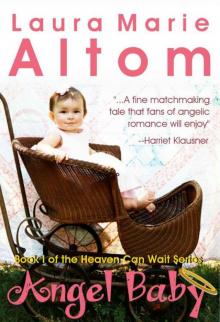 Angel Baby (Heaven Can Wait)
Angel Baby (Heaven Can Wait) St. Patrick’s Baby (SEAL Team: Holiday Heroes Book 4)
St. Patrick’s Baby (SEAL Team: Holiday Heroes Book 4) To Catch A Husband (U.S. Marshals, Born And Bred Book 4)
To Catch A Husband (U.S. Marshals, Born And Bred Book 4) The Baby Twins (Babies & Bachelors USA)
The Baby Twins (Babies & Bachelors USA)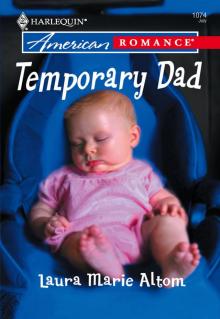 Temporary Dad
Temporary Dad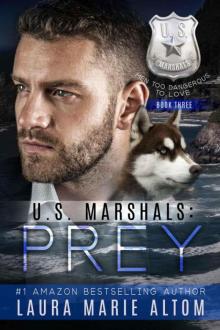 U.S. Marshals: Prey (U.S. Marshals Book 3)
U.S. Marshals: Prey (U.S. Marshals Book 3) Home on the Ranch: The Colorado Cowboy's Triplets (Cowboy SEALs Book 8)
Home on the Ranch: The Colorado Cowboy's Triplets (Cowboy SEALs Book 8) The Rancher's Twin Troubles (The Buckhorn Ranch Book 2)
The Rancher's Twin Troubles (The Buckhorn Ranch Book 2) A Wedding For Baby (Baby Boom)
A Wedding For Baby (Baby Boom) Need (Bad Boys with Billions Book 3)
Need (Bad Boys with Billions Book 3) A Cowgirl's Secret (The Buckhorn Ranch Book 3)
A Cowgirl's Secret (The Buckhorn Ranch Book 3) A Baby On The Way
A Baby On The Way Home on the Ranch: Colorado Cowboy SEAL
Home on the Ranch: Colorado Cowboy SEAL The Right Twin (Times Two Book 2)
The Right Twin (Times Two Book 2) A Baby In His Stocking (The Buckhorn Ranch Book 4)
A Baby In His Stocking (The Buckhorn Ranch Book 4) The Marine's Babies (Men Made In America)
The Marine's Babies (Men Made In America) Found (Bad Boys with Billions Book 2)
Found (Bad Boys with Billions Book 2) Lost (Bad Boys with Billions Book 1)
Lost (Bad Boys with Billions Book 1) Dancing With Dalton (Fatherhood)
Dancing With Dalton (Fatherhood) Christmas Cookie Baby
Christmas Cookie Baby U.S. Marshals: Hunted (U.S. Marshals Book 1)
U.S. Marshals: Hunted (U.S. Marshals Book 1) Be My Valentine, Baby
Be My Valentine, Baby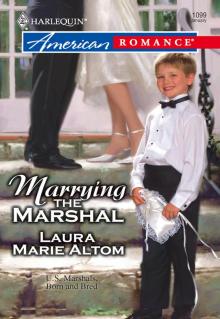 Marrying the Marshal
Marrying the Marshal Saving Joe (U.S. Marshals, Born And Bred Book 1)
Saving Joe (U.S. Marshals, Born And Bred Book 1)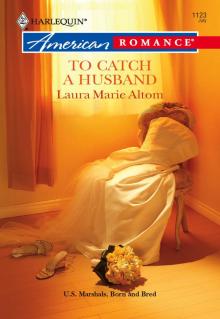 To Catch a Husband
To Catch a Husband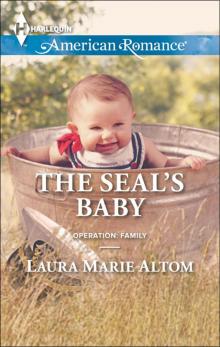 The SEAL's Baby
The SEAL's Baby The Bull Rider's Christmas Baby
The Bull Rider's Christmas Baby Renegade: Rodeo Knights, A Western Romance Novel (SEAL Team: Disavowed Book 5)
Renegade: Rodeo Knights, A Western Romance Novel (SEAL Team: Disavowed Book 5) Be My Valentine, Baby (SEAL Team: Holiday Heroes Book 3)
Be My Valentine, Baby (SEAL Team: Holiday Heroes Book 3) The Cowboy SEAL's Jingle Bell Baby
The Cowboy SEAL's Jingle Bell Baby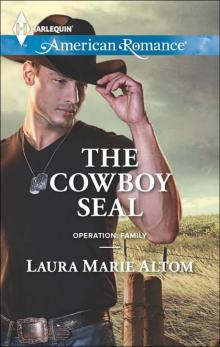 The Cowboy SEAL
The Cowboy SEAL The Rancher's Twin Troubles
The Rancher's Twin Troubles Forsaken (SEAL Team: Disavowed Book 6)
Forsaken (SEAL Team: Disavowed Book 6) The Baby Twins
The Baby Twins Christmas Cookie Baby (SEAL Team: Holiday Heroes Book 1)
Christmas Cookie Baby (SEAL Team: Holiday Heroes Book 1) A SEAL's Secret Baby
A SEAL's Secret Baby The Baby and the Cowboy SEAL (Cowboy SEALs 2)
The Baby and the Cowboy SEAL (Cowboy SEALs 2) Cowboy SEAL Daddy
Cowboy SEAL Daddy Rogue (SEAL Team: Disavowed Book 1)
Rogue (SEAL Team: Disavowed Book 1)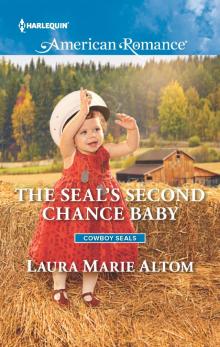 The SEAL's Second Chance Baby
The SEAL's Second Chance Baby Rogue
Rogue Outcast (SEAL Team: Disavowed Book 2)
Outcast (SEAL Team: Disavowed Book 2) The Baby Battle
The Baby Battle The SEAL's Stolen Child
The SEAL's Stolen Child Happy New Year, Baby
Happy New Year, Baby Possess
Possess Exiled (SEAL Team: Disavowed Book 4)
Exiled (SEAL Team: Disavowed Book 4)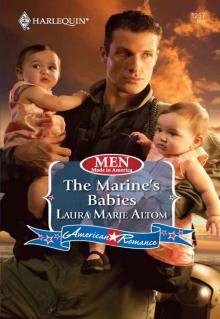 The Marine's Babies
The Marine's Babies Shunned (SEAL Team: Disavowed Book 3)
Shunned (SEAL Team: Disavowed Book 3)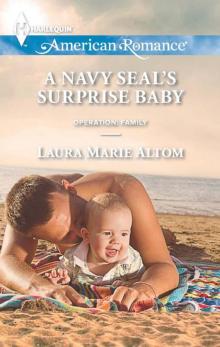 A Navy SEAL's Surprise Baby
A Navy SEAL's Surprise Baby The SEAL's Christmas Twins
The SEAL's Christmas Twins Happy New Year, Baby (SEAL Team: Holiday Heroes Book 2)
Happy New Year, Baby (SEAL Team: Holiday Heroes Book 2) The Escort
The Escort Control
Control